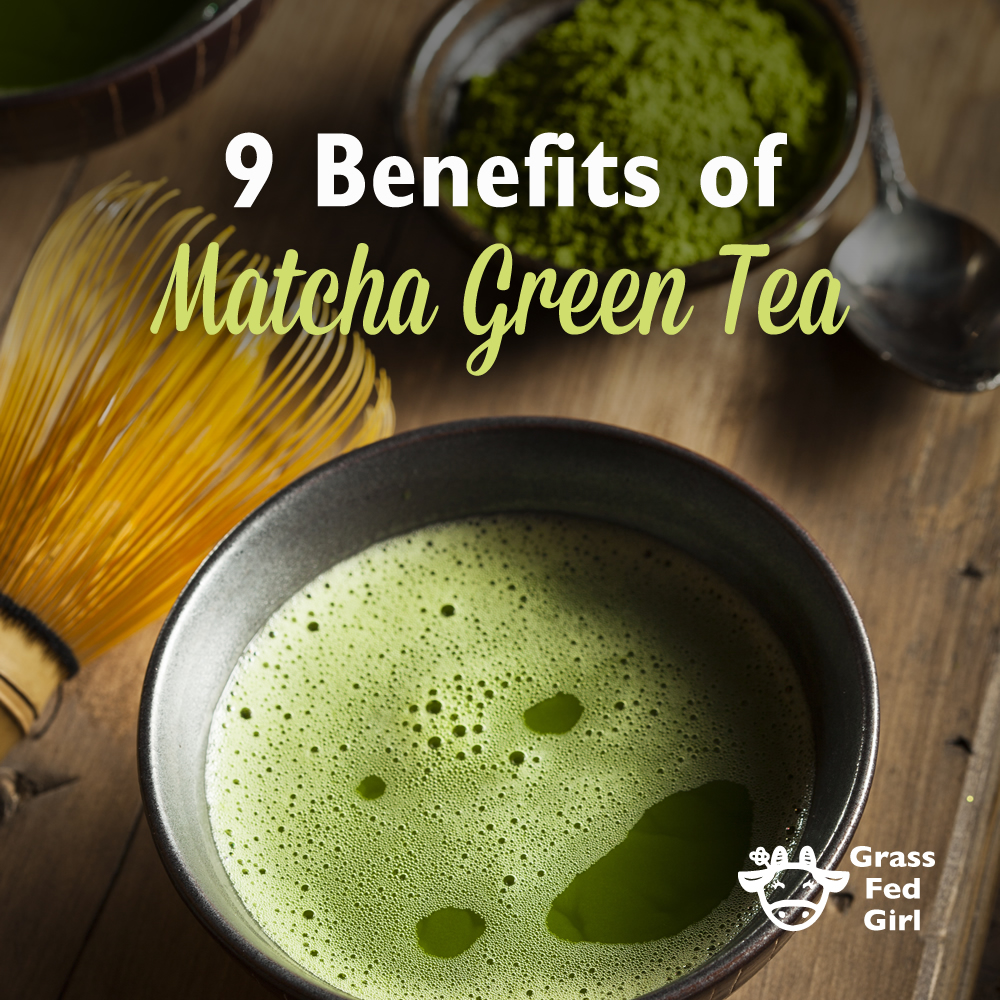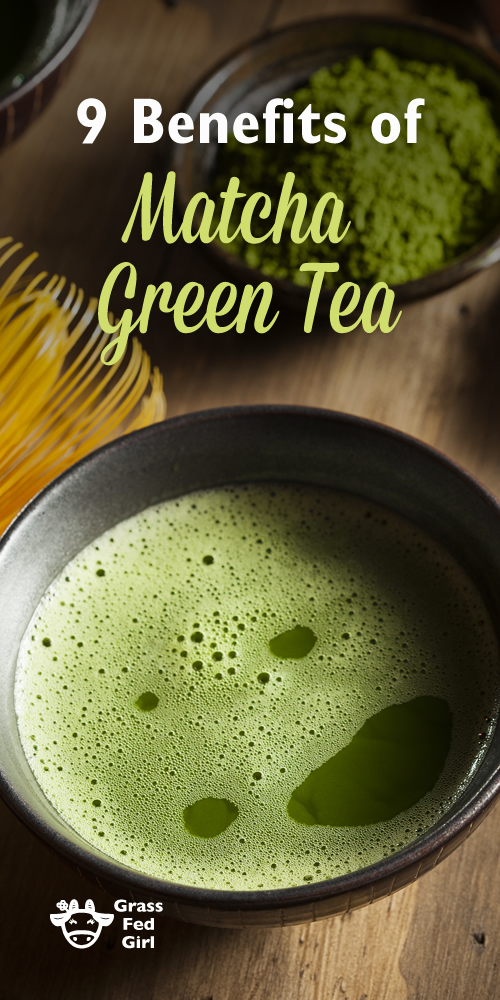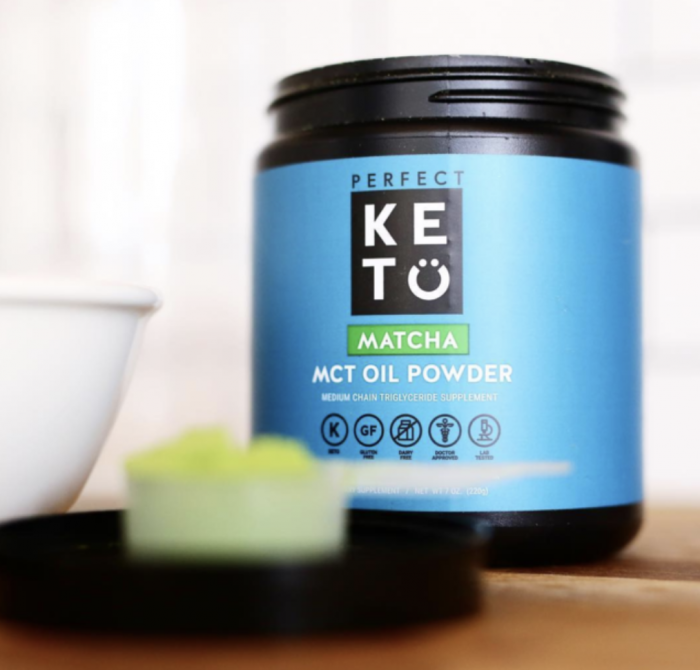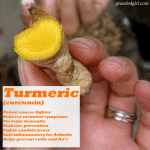From GFG: This is another great guest post by my trusty intern: Coco Noel. Be sure to like follow her smart and informative posts on Facebook! I invited her over to brunch recently and she brought some Matcha green tea. We mixed it with hot water, coconut milk and a little stevia and it was divine. I had actually never had it before and she was the first person to bring it to my attention. I hope you enjoy learning more!
9 Health Benefits of Matcha Green Tea
First there were pomegranates. Then came goji berries. Now, it’s matcha green tea that everyone’s fussing over. Fortunately, matcha lives up to its hype. For starters, it contains 10x the antioxidants of pomegranates and 5x the antioxidants of goji berries.
Matcha is essentially very finely powdered green tea leaves that are mixed into liquid and consumed whole. Unlike regular steeped green tea, when you drink matcha, you’re ingesting the entire crushed up tea leaves rather than just the leaf-infused water.

This means you’re getting a much more concentrated dose of the myriad health benefits of green tea, some of the benefits of matcha green tea are listed below:
- Reduce the risk of cancer: A study published in the American Journal of Clinical Nutrition found that women who regularly drank green tea had a lower risk of colon, stomach and throat cancer. Other studies have shown an associated decrease in prostate cancer and found a link suggesting green tea may slow down the growth of tumors in breast cancer patients.
- Weight loss: Approximately 2 cups of green tea will speed up your metabolism by nearly 5% in a 24 hour period. This isn’t a miracle diet solution, but definitely a plus.
- Immunity: Green tea may help you fight off illness by altering the makeup of intestinal bacteria. Findings suggest that green tea can also reduce allergic responses and asthma.
- Diabetes: Not only does green tea help improve insulin sensitivity in type 2 diabetics, but one study found that drinking more than six cups of green tea per day slashed the risk of developing type 2 diabetes by 33%.
- Oral health: Green tea strengthens your teeth, thus decreasing your risk of cavities. Its antibacterial properties thwart the effects of the bacteria most responsible for gum disease. And it may even help ward off bad breath!
- Liver health: Green tea prevented liver damage in rats who were kept drunk on alcohol for 4 straight weeks. (Talk about a bender!) It also destroys free radicals in people with fatty liver disease.
- Skin health: German researchers found that drinking six cups of green tea per day can help your skin be more resistant to sunburn. Some studies even suggest that components of green tea can help prevent skin cancer when applied directly to the skin.
- Alzheimer’s prevention: Although there is no known cure for Alzheimer’s disease, numerous studies suggest that green tea may effectively help to prevent the disease. A compound in green tea reduces the formation of plaque-like deposits in the brain, which are often indicative of Alzheimer’s disease.
- Relax: Green tea increases the production of alpha brain waves to calm the body.
The Matcha Advantage
Many of the studies done on the effects of green tea are based on pretty high levels of the stuff – from about 2 to 10 cups daily. Before you quit your job and commit the rest of your life solely to drinking green tea and going pee, check this out:
One cup of matcha green tea is equivalent to 10 cups of green tea in terms of antioxidant content.
But wait! There’s more. Epigallocatechin gallate (say that five times fast) is a polyphenol antioxidant found in green tea. Commonly referred to as EGCG, this is what’s considered to be responsible for nearly all the health benefits of green tea, including those listed above. I hope you’re wearing your party hat, because I’m about to give you cause to celebrate…
A study in the Journal of Chromatography found that matcha had 137 times more available anti-cancer EGCG than China Green Tips green tea.
That means that by drinking one cup of matcha green tea, you can reap the antioxidant benefits of 10 cups of traditionally steeped green tea and the EGCG benefits of 137 cups of China Green Tips.
Recommendations for incorporating matcha green tea into your diet:
-
- ½ teaspoon – 2 teaspoons of matcha per day
- While it’s relatively low in caffeine, avoid consuming late at night
- Note: Only drink matcha with low-protein liquids like water, coconut milk, rice milk, or almond milk. Research suggests that protein, particularly that in cow’s milk, deactivates the EGCG. This is no good! For this reason, it may be wise to drink your matcha away from meals (which is better for digestion anyway).
- Avoid commercial matcha green tea concoctions, as they are low in matcha but extremely high in calories and sugar (not to mention often mixed with dairy, thus negating their health benefits!). Peet’s Coffee has a 16 ounce matcha green tea freddo, which delivers 250 calories and 44 grams of sugar – and that’s without the whipped cream. Even worse, a 16 ounce sweetened matcha green tea latte from Starbucks has 350 calories and 55 grams of sugar! That’s very likely to do you much more harm than good.
Make your own at home for best results:
-
- Try a Matcha Refresher: put ¼ – ½ tsp of matcha into a 16 ounce water bottle and shake till dissolved
- Or make a Matcha Latte: Whisk ½ tsp in a pot of 2/3 cup almond or coconut milk and 1/3 cup water and bring to a simmer. Add a bit of stevia, coconut nectar or other raw honey to taste.
Where to Find a Matcha Online: click here
Thanks for reading! –Coco
Leave a comment about how you would like to use Matcha ?
http://www.naturalnews.com/037839_green_tea_cancer_prevention_cardiovascular_disease.html#ixzz2Sadr5HRY
http://www.med.nyu.edu/content?ChunkIID=21771
http://www.jbc.org/content/early/2013/02/05/jbc.M112.400358






We love green tea but what about the reports of high fluoride being found in the tea now?
I’ve tried matcha before but it’s too ‘grassy’ for me. I did, however, find a wonderful flavored matcha from Jade Monk. I now drink several cups a day. You might want to check them out. Thanks for the post.
Hooray! I was so happy to hear the latest info regarding the effects of drinking Matcha or Sencha green tea with cow’s milk. See below, copied from the FAQ page on Sei Mee Tea’s website: http://www.groundgreentea.com
5. Is it true that cow’s milk negates green tea’s antioxidants?
No, it is not true.
Casein, a kind of milk protein, was believed to negate Catechins’ antioxidant activities. After many studies on this subject were done, scientists found that Catechins are just released more slowly when consumed with milk protein and actually extend the effects of the green tea antioxidant activities. As a result, the effect of catechin lasted from 4 to 8 hrs after the green tea was consumed with milk proteins, while the effect lasted only 4 hrs after green tea alone was consumed.